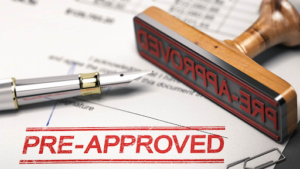Mortgage Pre-Qualification vs Pre-Approval: A Comprehensive Guide for Home Buyers
Understanding the Difference Between Mortgage Pre-Qualification and Pre-Approval
Get ready to break through the approval finish line and celebrate like a champion.
Introduction:
When you’re in the market to buy a home, it’s important to understand the key steps in the mortgage process. Two terms that often come up are “pre-qualification” and “pre-approval.” While they may sound similar, they actually have distinct meanings and implications. In this blog post, we’ll delve into the difference between mortgage pre-qualification and pre-approval, helping you navigate these stages with confidence.

Understanding Mortgage Pre-Qualification
Pre-qualification is usually the first step in the mortgage application process. It is a preliminary assessment conducted by a lender to determine how much money you may be eligible to borrow based on the information you provide. The process is typically quick and straightforward, often taking just a few minutes to complete.
During pre-qualification, you’ll share details about your income, assets, debts, and credit score with the lender. They will evaluate this information and provide you with an estimate of the loan amount you may qualify for. Pre-qualification is typically done without a thorough review of your financial documents, and it does not require a hard credit inquiry.
It’s important to note that pre-qualification is not a guarantee of a loan or a commitment from the lender. It merely gives you an idea of what you might be able to afford based on the information provided. Pre-qualification can be a useful initial step to help you understand your budget and narrow down your home search.

The Importance of Mortgage Pre-Approval
Pre-approval is a more detailed and significant step in the mortgage process. Unlike pre-qualification, pre-approval involves a thorough review of your financial information, including income, assets, debts, employment history, and credit score. The lender will require you to complete an official mortgage application and provide supporting documents such as bank statements, tax returns, pay stubs, and more.
Once you’ve submitted all the necessary documents, the lender will assess your financial profile and verify the information provided. They will also conduct a hard credit inquiry to obtain a comprehensive view of your creditworthiness. Based on this thorough evaluation, the lender will issue a pre-approval letter, which outlines the loan amount you qualify for, the interest rate, and any conditions that must be met.
Obtaining a pre-approval letter carries more weight in the homebuying process. It shows sellers that you are a serious buyer with the financial means to secure a loan. Pre-approval gives you a stronger negotiating position and can make your offer more competitive in a competitive housing market.

Key Distinctions between Pre-Qualification and Pre-Approval
- Level of Detail: Pre-qualification is a preliminary assessment based on self-reported information, while pre-approval involves a comprehensive review of financial documents and credit history.
- Confidence Level: Pre-approval provides a higher level of certainty as it is based on verified information, whereas pre-qualification is a rough estimate based on the information you provide.
- Documentation: Pre-approval requires the submission of detailed financial documents, while pre-qualification is typically based on self-reported information and does not involve documentation.
- Seller Perception: Pre-approval carries more weight with sellers, demonstrating that you have undergone a thorough evaluation and are a serious buyer.

Conclusion: Making Sense of Mortgage Pre-Qualification and Pre-Approval
In summary, mortgage pre-qualification and pre-approval serve different purposes in the homebuying process. Pre-qualification provides an estimate of how much you may be able to borrow, while pre-approval is a more comprehensive assessment based on verified financial information. While pre-qualification is a useful starting point, obtaining a pre-approval letter gives you a stronger position as a buyer and enhances your chances of successfully securing a mortgage. By understanding these differences, you can navigate the mortgage process with clarity and confidence.

Mortgage Consultation Today!
Tags In
Categories
- Credit (4)
- FHA Loans (3)
- Finances (3)
- First Time Home Buyers (6)
- Grab Bag (7)
- Home Technology (1)
- Homebuying Tips (17)
- Inspiration (1)
- Insurance (3)
- Interest Rates (3)
- Loan Process (1)
- Mortgage Financing (14)
- Motivation (1)
- News (1)
- Press Release (8)
- Renovation (2)
- Self Employed (1)
- Tips & tricks (1)
- Uncategorized (134)
- USDA Loans (1)
- VA Loans (2)




